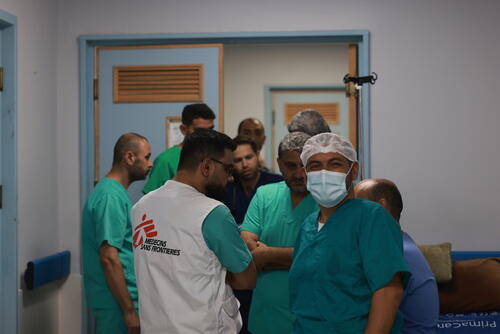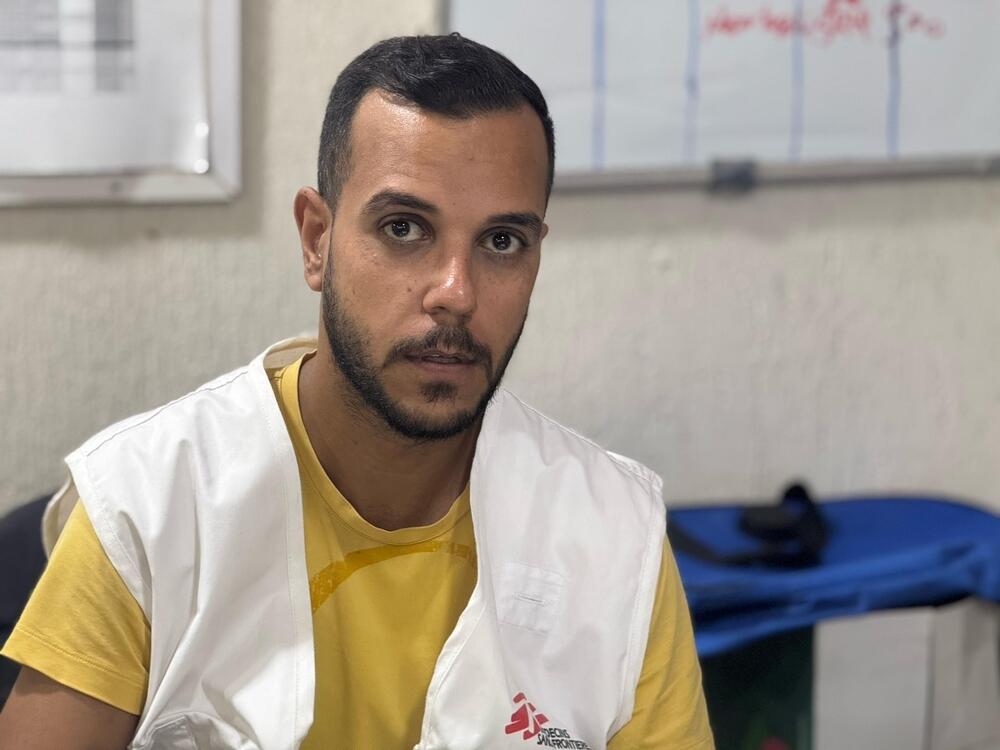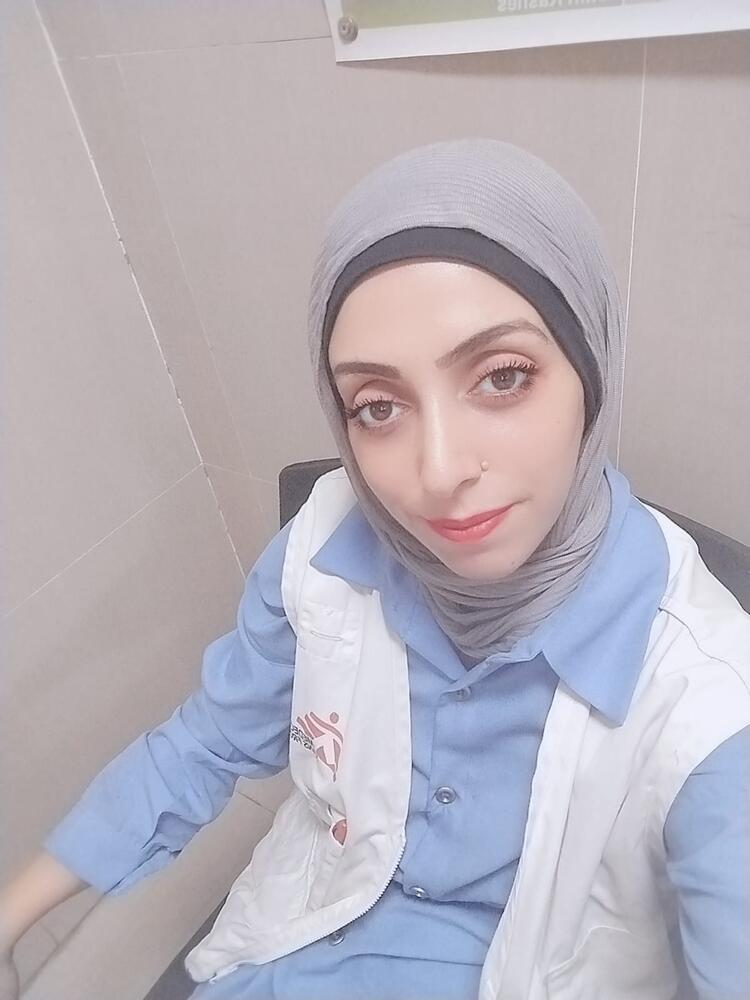Staff Testimonies: Gaza City evacuation orders
10 September 2025
Gaza City is facing a humanitarian catastrophe as Israel’s latest military assault escalates, pushing people to the brink and threatening the survival of what remains of the health system.
Following the full evacuation order and the rapidly worsening conditions, two staff in Gaza City give their testimonies:
Mohammed Al-Tibi, MSF supply chain officer
"My name is Mohammed Al-Tibi. I currently live in the north, in Gaza City, in the Nasr neighbourhood, on the western edge of Sheikh Radwan. The situation over the past two weeks—up until this moment—has been extremely difficult because of the random shelling, artillery fire, quadcopter drones, and the constant danger in the area where I live.
Still, I decided to stay in my home until the very last moment, as long as things remained somewhat under control. I’ve limited my movements.
This morning, I was surprised to see a leaflet circulating on social media, calling on all Gaza residents to move south because Gaza City had become a dangerous combat zone. I was shocked by the news. I was already at work in the south when I saw it.
Right now, I feel completely lost—torn between whether I should go back to get my belongings and my family and stay, risking my life to do so, or remain where I am, even though there’s nowhere in the south to evacuate to. There is simply no alternative. If I leave my home now, I’ll be thrown into the street.
I honestly don’t know how else to describe this situation—I feel like everything is lost. I’ve decided that for now, I will not evacuate—unless I find a real alternative.
Still, I told my wife and daughters to prepare their things. I have two little girls. One is six or seven, and the other is just two.
From the very first day of this war, Israel has carried out a campaign of genocide against us. This is not something new, I’m surprised by the statements coming from the Israeli side claiming that they want to enter Gaza again and carry out new operations. They were already here many times. They already did everything. There is nothing left they haven’t done. It has been turned into rubble.
This is about forced displacement—to increase our suffering and put pressure on us as ordinary civilians. I have the right to live in a place that is at least somewhat safe. But I am not being given that chance.
We already evacuated once, to the south, to areas that were declared “safe humanitarian zones” by the Israeli forces. We went to Rafah, to Al-Nuseirat, and to other places. They claimed those areas were safe—but they weren’t.
I still carry the fear of more displacement—that it will all happen again. That I won’t be going to a safe zone as they claim, but to a place where, sooner or later, they’ll come after us. Because their real goal is to displace us—to increase our suffering, and to try to exterminate us."
Donate to the Gaza Emergency Regional Fund
Help provide vital medical care to those who need it most.

Lina Batniji, MSF Lay Counselor Educator
"My name is Lina Batniji, and I don’t even know where to begin. We have women patients in red zones—areas that are classified as extremely dangerous. Some of them have C-sections scheduled for today, tomorrow, by the end of the week, and others later this month. If any of these women are displaced and go into labour, they need surgery.
Without access to a hospital, this could cost them their baby—or their life.
These women are living in terror. They know that no ambulance will come to the red zone to pick them up so they can deliver safely. There’s no way for them to reach the hospital that still performs C-sections—though God only knows how much longer it will even be functioning.
Where’s humanity when a woman in the red zone goes into labour during airstrikes and evacuations? How is she supposed to get to the hospital? The problem isn’t just danger—it’s transportation. There is no way for them to move from the red zones to where she can give birth safely.
And for those who ask why these women didn’t leave earlier—because they can’t even afford food. There are people in Gaza right now who cannot access food. We are suffering from systematic starvation. The food that is getting in is either unhealthy or too expensive—95% of people cannot afford to buy it. Also transport alone costs more than most people can afford.
I thought our suffering had ended when we returned to Gaza City during the ceasefire. We had accepted the war, accepted that it would return. But to be forced to leave Gaza City again? That has broken something in us. We’re now collecting the fragments of our previous lives, the little we have left, hoping we’ll find a place to go—but even that hope is gone. Now, we are heading into the unknown, into nothingness, with only the things we could save from our destroyed homes. We are leaving with shattered bodies and broken souls.
We’re heading toward a past we cannot change, a present we cannot understand, and a future that is nowhere to be found. We are going to places in the south where there’s no one waiting for us, no space for us. We feel like a burden on this world. And honestly, death feels easier than this path of displacement. It’s no longer something we fear. We die a little more every day, and we still wake up in the morning pretending we can keep going.
I can’t even console my children anymore. I can’t reassure them. All we’re clinging to are illusions—that maybe there will be an agreement, maybe a ceasefire, maybe a solution. But all these negotiations are lies meant to drain us—to wear us down, to exhaust civilians until there’s nothing left.
Our only wish is to be safe. Not even in real homes—we’re now in animal shelters, bird nests, whatever we can find. We’ve already let go of the idea of having our houses back. Just let us stay where we are. But they say: “Go to humanitarian zones.” So I ask—where are these zones?
We try to go to these so-called safe areas and find nothing. No space, no safety. Just overcrowding, disease, and filth. Where can we go as civilians? I am asking for a space with a bathroom. Is that too much? Is it a fantasy to ask for clean water, a bathroom, four walls to protect my children from bombs, heat, cold, and disease?
What are the humanitarian standards? Because if I’m living in a tent, next to raw sewage, how is that a humanitarian zone? Is this what the world now calls humanity?
And then there’s the deeper heartbreak. I wish I had the skill to compress a home into a suitcase. I wish someone had taught me how to fold dreams, memories, and entire lives into a bag. I wish I knew how to walk away from everything and treat it as just a memory. This displacement isn’t our first. But the first time, we believed we’d return. Now, I am leaving Gaza City knowing I will not come back.
I am leaving this place I love, this sky I’ve known, this air that knows me. And I’m leaving as though I’ve thrown my soul into Gaza City, and only my body is walking away.
This feeling—this feeling is death. I don’t know what death truly is, but this… this is what it feels like."
MSF in Palestine
The genocidal campaign waged by Israeli forces in Gaza for over 20 months has led to an unprecedented humanitarian catastrophe. As of July 2025, over 56,000 people have been killed in Gaza, including 12 MSF staff.


